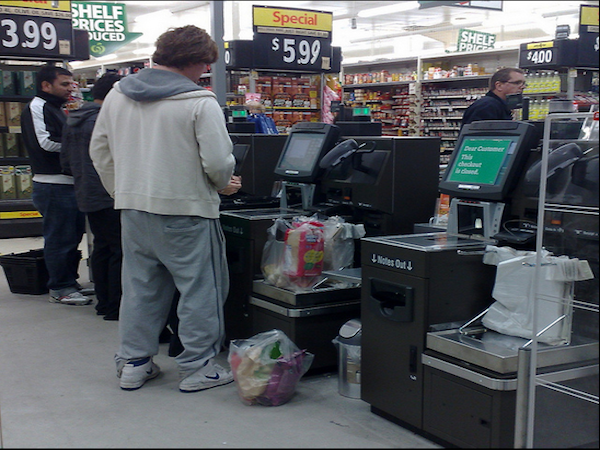Self-serve is the way of the future, eradicating supermarkets of the awkward chitchat with the checkout chick when it’s your turn to buy toilet paper. While this sounds like a great idea for purchasing those embarrassing items, it may not be the most secure. The latest time and money-saving process has led to a new wave of thieves who take advantage of the morality-based system.
After conducting a private poll with 50 university students, 38 admitted to ‘shoplifting’ from the self-serve checkout, but not all participants accepted this act as stealing. Most claimants pursued a very defensive justification for their wrong-doings, likening it to a metaphorical ‘Robin Hood’ scenario.
It seems that ‘poor’ university students are able to rationalise weighing their bananas as carrots to save a buck, because they’re “doing it tough” financially.
Self-confessed serial stealer 22-year-old Veronica*, believes that Woolworths make a ludicrous profit and that her taking an item here and there is justifiable, while she struggles with money through her university degree.
“I wouldn’t necessarily call it stealing. Sometimes I scan more expensive items such as mangoes and register them as carrots, which are really cheap. In the end I’m still paying for something,” she says.
“Supermarkets such as Woolworths and Coles are massive corporations who continuously undersell customers, including hard-working farmers. I feel as though my small actions will not affect the supermarket in any way.”
Basically, Veronica see’s her deceitful deed as simply balancing out the class-warfare of society.
But how exactly are these desperados manipulating the lucrative grocery stores?
Meet John*. He is your typical Safeway store manager and has first hand experience in monitoring the self-service area. He knows the tricks of the trade but must remain anonymous in order to keep his job.
I spoke with John to confirm my belief that many of my fellow peers are in fact rorting the supermarket self-service system.
John explains he is aware of the manipulation that is occurring, but he is unable to supervise every customer self-serving, so a lot of people exit unscathed.
“In certain stores customers are able to place an unscanned item in their shopping bags without detection, when there aren’t scales used in the bagging area,” he says.
“I have had to question customers on why they have three bags of carrots registered on their machine, yet only one carrot in their shopping, it’s very deceitful.”
In 2012 Woolworths generated a total revenue of more than $55.5 billion. So far this year their first half profit has grown to $1.15billion, as earnings from its supermarkets rose by six per cent in comparison to last year.
I was unable to find evidence of whether this new wave of theft has had any affect on their profitable business, but these comparative statistics indicate that Woolworths seem to be doing just fine regardless of thieving.
Irrespective of the financial shake this embezzlement has on supermarket chains, the real issue is the justification of criminal activity.
These self-proclaimed ‘poor’ university students are not struggling to feed themselves each day like 2 million other Australians living in poverty. Often having your rent paid by mum and dad while living off Centrelink payments is a remarkable privilege that many students take for granted.
The term has become too loosely used. The problem lies with our definition of poor. These days not having enough cash to do whatever you want, whenever you want has unwelcomingly crept into our classification of ‘broke’.
Our absurd definition of poor is a result of a growing social expectation, particularly with young adults. Dropping $60 on a night out inclusive of a late night kebab and opting for a cab rather than a tram, in no way, can justify being broke. The term ‘first world problems’ comes to mind, making it easier to look past those who are sincerely struggling.
While this article may have inspired the temptation that stealing is easily justified and possibly beneficial, The Victorian Legal Aid office reiterates that stealing is in fact a crime that will land you a criminal record and the possibility of imprisonment.
I relayed this information to the aforementioned self-confessed stealer who admitted she reconsidered her act of saving a couple of bucks per shop when weighing up the risk of a criminal record.
While this advice may have instilled righteousness upon a past sinner, there are still at least 37 other misguided undergraduates that need to be brought back to reality to realise not being able to buy your grocerys and fund going out three times a week is not poor. Take a look at those around you who are genuinely struggling before you declare social bankruptcy, because no one is above the law.
*Names have been changed
 Bridget Rollason is a Bachelor of Journalism student and a member of the upstart editorial team. You can follow her on twitter @didgeriedoo.
Bridget Rollason is a Bachelor of Journalism student and a member of the upstart editorial team. You can follow her on twitter @didgeriedoo.







